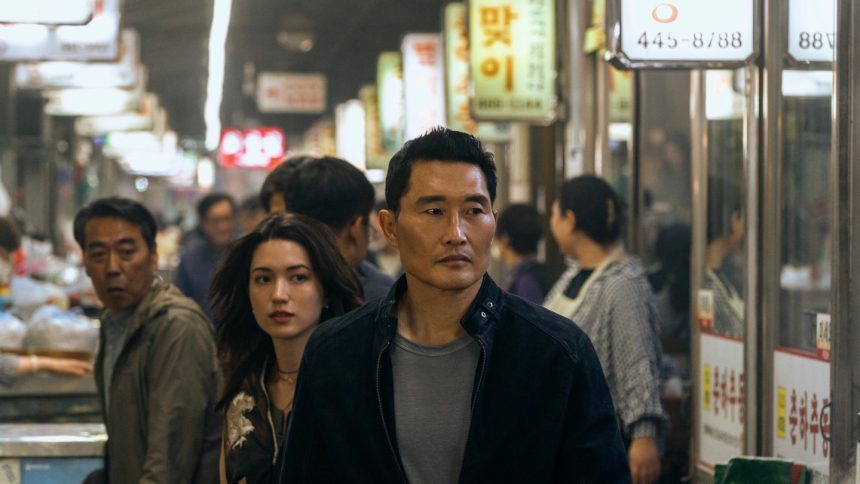‘Butterfly’ Review: Daniel Dae Kim Is a Superspy Superdad in Amazon’s Blandly Sweet Thriller
At first blush, it might not seem that there would be anything remotely relatable about Butterfly, Amazon’s adaptation of the graphic novel by Arash Amel. Hero David (Daniel Dae Kim) is an ex-agent we find on a self-directed mission to catch a younger assassin, Rebecca (Reina Hardesty). Both are elite operatives able to charm their way into a room full of guards or kick their way out of one, and both are linked to a shadowy organization powerful enough to shape world events.
But David, we soon realize, is working not to save the world, but to save Rebecca — his daughter, who has understandably mixed feelings about discovering that the father she’d believed dead has merely been absent. (Unwillingly, he insists, but still.)
Packed as the series is with fistfights and shootouts and car chases, its heart truly lies in the family drama, driven by heightened but recognizable impulses. And while the series, created by Steph Cha and Ken Woodruff, never quite takes that intriguing premise to its fullest potential, its mix of sentiment and thrills makes for a pleasantly innocuous addition to the platform’s ever-growing catalogue of shows about guys who know their way around tactical gear.
The Kitao Sakurai-directed premiere establishes itself as an actioner first. Before we’ve even properly met our leads, we’re thrown into an elaborate sequence of them working against each other. Rebecca has infiltrated a Seoul hotel in order to kill a high-ranking Russian official, while David has done the same at a nearby karaoke bar in hopes of intercepting her. Both are cool and competent in their work, and there’s some pleasure in watching her don and doff disguises to move around undetected, or him whale on a henchman to the strains of ABBA’s “Dancing Queen.”
You Might Also Like
But only some. Despite taking up 13 whole minutes of a 49-minute run time, the sequence feels perfunctory, blessed with neither inventive choreography nor elegant camerawork and editing. (Not every thriller has to be John Wick, but there’s a reason its fans go gaga over its creative stunt work, shot in a way that you can actually appreciate it.) So it typically goes with Butterfly’s action: It’s not that the show provides no fun on that front, but it tends to spread that fun rather thin over long, mostly generic stretches.
The show fares somewhat better with its more intimate material. Once David catches up with Rebecca, father and daughter hop from city to city across South Korea to stay one step ahead of Caddis, her current employer and his former company. Inevitably, years of pent-up feeling begin to bubble up.
David insists he had no choice but to fake his own death nine years ago in order to protect her, and Kim’s tough but kindly demeanor makes us believe him absolutely. Nevertheless, he’s filled with regret at the toll his disappearance has taken on her. Rebecca cycles between shock, fury, joy and grief, and Hardesty’s emotional performance allows glimpses of the adoring little girl or surly teenager she must have once been, peeking out from beneath the jaded 23-year-old killer she is now.
Their chemistry, spiky but ultimately sweet, is counteracted by the chillier one between their counterparts at Caddis: Juno (Piper Perabo), its cynical cofounder, and Oliver (Louis Landau), the insecure son who can’t quite match her ruthlessness.
While both sides of this cat-and-mouse game are willing to bust out knives or guns (or in Juno’s case, a knife-wielding mercenary named Gun, played by Ji-hoon Kim), it’s telling that when they really need to make an impact, it’s emotional torture they turn to. Nothing, Juno and Oliver and David and Rebecca all recognize, is more painful than a child’s fear of going unloved by a parent or a parent’s fear of harming their child. In the moments when these larger-than-life operatives are confronted with such elemental terrors, they suddenly seem pitiably, disarmingly human.
But Butterfly is only able to carry these feelings so far, or allow them to get so complicated. The series lacks the nerve to let David come across as anything other than a noble hero, despite his own history as a deadly mercenary, or to more fully explore Rebecca’s possibly sociopathic tendencies. (This is a woman who, when she finds herself up on a rooftop with Dad, casually wonders what it’d be like to throw someone off it.)
The use of South Korean locations beyond the usual touristy hotspots is one of Butterfly’s more distinctive qualities, adding welcome texture to scenes like one of David and Rebecca hiding from their enemies behind the inherent chaos of a night market. Otherwise, however, the universe feels constructed from a grab bag of clichés like “crusading senator” (Charles Parnell) or “saintly wife” (Tae Hee Kim). It’s neither stylized enough to fully embrace the outlandishness of its premise, nor grounded enough to avoid silly lapses in logic.
The light touch has its advantages. Viewers just looking for an easy distraction might find that this version goes down easier than a darker, sharper series might have. But in letting its promise so far outpace its execution, the six-episode season struggles to take flight.







